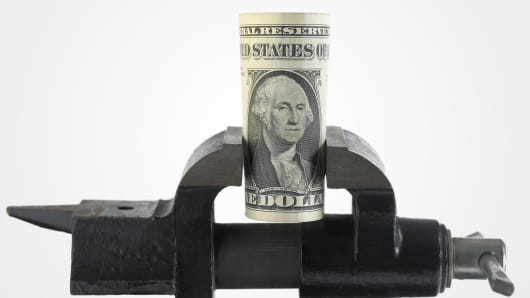At the center of the issue is the $1 per share value — the net asset value or NAV — associated with money market funds, as well as the amount funds should have in reserve.
Investors can almost always buy and sell money market shares at the $1 value while fund managers invest the money in low risk securities like government and corporate bonds as well as for lending between banks — reasons why money market funds are considered safe investments and almost like savings accounts.
But money market funds can go below the $1 mark — or break the buck — as they did in 2008 during the financial crisis when the now defunct Reserve Primary Fund incurred losses on debt it held from a bankrupt Lehman Brothers and reduced its NAV to 97 cents a share. (Read more: Fidelity: 401(k) Balances Grew 12% to Record High in 2012)
That caused a run out of money market funds to the tune of $134 billion. That exodus put pressure on short term credit markets and all kinds of borrowers. While a great deal of that money has returned to money market accounts, regulators fear it could happen again.
To stop a future run or collapse, the FSOC proposes to let the share price for money market funds 'float' in value, like stock and bond mutual funds, rather than stay fixed at the dollar mark. Funds would also hold a total of three percent capital cushion to cover losses, as well as apply incentives to keep investors from pulling out their money during a market crisis.
But fund giants like Fidelity and Vanguard argue the industry has enough safeguards and are pushing back on any more reforms saying the cost of compliance would be too much.
Echoing the sentiments of most money market firms, Jerry Klein, managing director of HighTower, a financial services company, said a floating NAV would not reduce risk.
"If the goal is to reduce runs on money market funds, a floating NAV won't accomplish that," Klein said. "The NAV barely moves anyway. A stable NAV actually creates market stability. A better solution is more transparency which is already happening. We've seen Goldman and BlackRock voluntarily disclose their mark to market (market place value) NAV every day. Let the firms do it on their own."
"And there's a self imposed conservatism in money market funds these days which helps stabilize the funds," Klein said. "The rules from 2010 have brought some transparency and a lot less risk."
Out of the wake of 2008's run on money market funds, the Securities and Exchange Commission adopted new industry rules in 2010. Among them were requirements that funds hold at least 10 percent of their securities in liquid assets that could be sold within a day to cover losses. But there was no requirement on floating the NAV.
Fidelity Investments released a statement last week in regards to the FSOC's proposals saying, "We believe no further regulation is necessary for money market funds and that ... reform would actually increase systemic risk that would require extensive structural changes requiring extensive operational and record keeping adjustments."
The Investment Company Institute, a trade group representing investment firms, said that the FSOC proposals are "flawed" and while the group would look at ways to stop runs by investors any idea of a floating NAV would "change shareholder behavior and impose a host of tax and accounting complications as well as hurt the economy" through less investing in the funds.
"To me, it makes all the sense in the world to have a floating NAV," said Bill Harris, CEO of the investment advisory firm Personal Capital.
"The way you prevent runs is to you make the price of a security reflect the assets in the securities," Harris said. "A money market fund is an investment product where you can lose money. The likelihood is low but it's still there."
Only two money market funds have officially broken the buck. The first was a small institutional fund in 1994 and the second was Primary Reserve.
But a study by the Boston Federal Reserve Bank says that 78 money market mutual funds had to seek help from their sponsors to keep from having their share prices drop below a dollar from 2007 to 2011. Of the 78 money funds that asked for help from their management firms, 21 would have broken the buck without that assistance, according to the Fed study. And 32 funds needed help more than one time.
So where does this leave investors? Do the new rules make sense? (Read more: Can You Trust Your Taxman?)
"Money Market fund managers are much more conservative these days and they have the incentive to be in the middle of the pack and not take risks," said Jerry Klein. "Money market funds are a good low risk investment for someone who needs the ready cash. No new rules are needed."
"Advisers like me get much more sensitive when it comes to risk," said Howard Kaplan, a personal finance adviser in northern New Jersey. ( Read more: No Fees With Four Percent Interest: Too Good to Be Checking?)
"If there's a way to make the environment safer and boost consumer confidence, I'm not sure why these funds can't implement the changes," Kaplan said.
"Which is more important, an accounting headache or a systematic risk that could cause great harm?"



